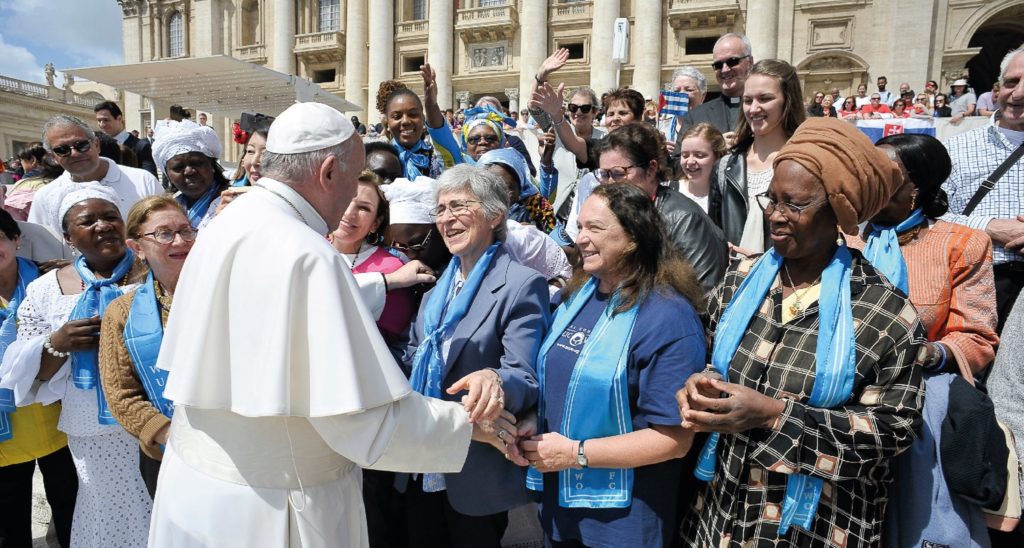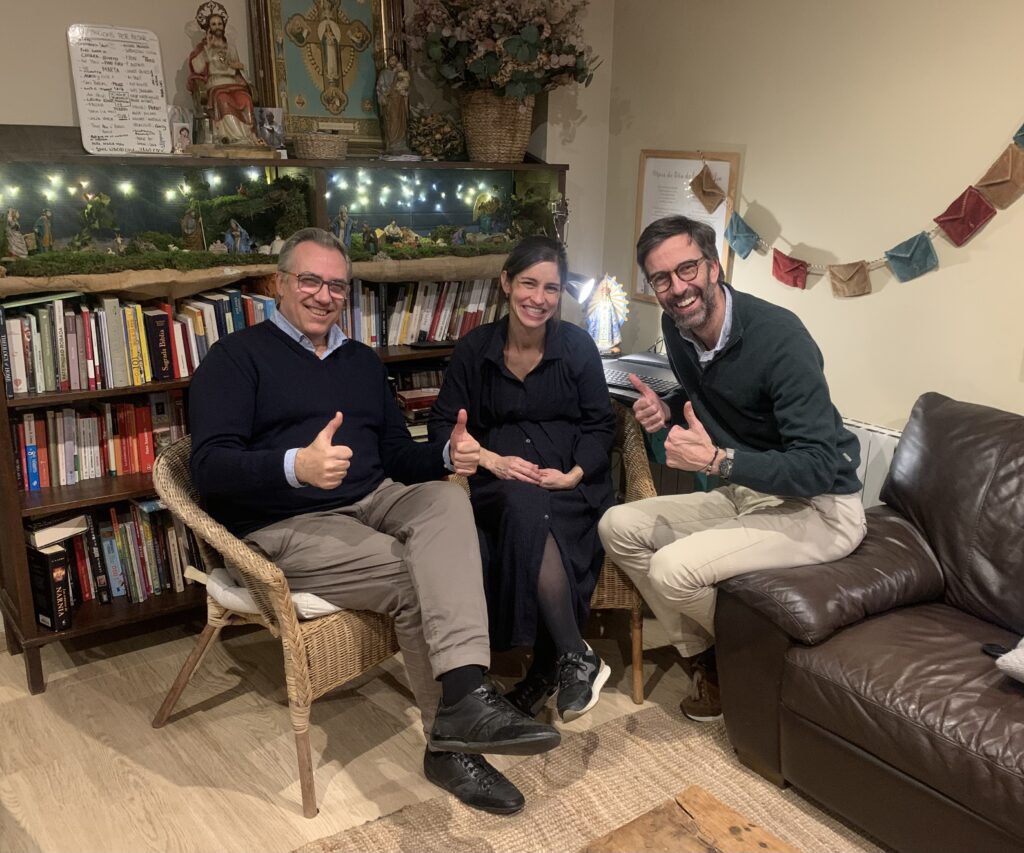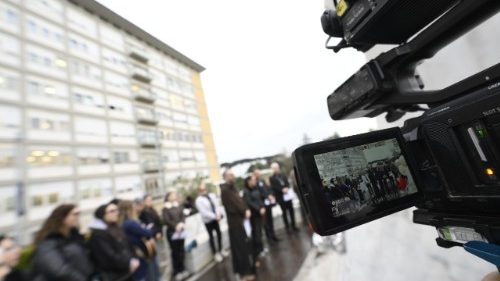Synodality in the Church and Women’s Value
Interview with José Antonio Rosas, Founder of the Latin American Academy of Catholic Leaders, and María Lía Zervino, President of the World Union of Catholic Women’s Organizations

José Antonio Rosas, Director, and Founder of the Latin American Academy of Catholic Leaders, and María Lía Zervino, President of the World Union of Catholic Women’s Organizations (WUCWO) talked exclusively with Exaudi today, June 18, 2021, on the occasion of the International Conference “Women in the Church: The Challenge of Synodality,” whose speakers included Sister Nathalie Becquart, Under-Secretary of the Synod of Bishops and the first woman with the right to vote in it
Monsignor Jorge Eduardo Lozano, Secretary-General of the Latin American Episcopal Council (CELAM); Dr Sophie Gadima, Minister of State of Africa and the only Catholic with this office in a Muslim government, and Cristiane Murray, first woman Vice-Director of the Holy See Press Office commented on the Conference, organized by the Academy and WUCWO.
Exaudi, which is associated with the international event, broadcast the Conference through its Facebook accounts in Spanish (www.facebook.com/ExaudiNoticias) and in English (www.facebook.com/ExaudiNews).
Here is a translation of the Interview’s full text.
* * *
Exaudi: How did the idea come about to set up such an important event and with woman as the flag?
José Antonio Rosas: It came about given the need to spread and make known the steps and actions Pope Francis has taken to give life and concreteness in reality to what the Gospel has always held: the equal dignity of men and women and women’s very valuable contribution to the life of the Church.
Exaudi: As an organization, what do you expect from this Conference?
José Antonio Rosas: In the first place we hope to have a dialogue between these four referents of international Catholic leadership, which will help us all to understand the meaning of synodality in the life of the Church, which has concrete implications for women’s participation and contribution. But in addition, we hope it will be an opportunity to live and experience our ecclesiality, our sense of belonging to a Church that goes beyond borders, cultures, and languages, uniting us Christian men and women, of the Four Continents.
Exaudi: How has the pandemic affected the development of the event?
José Antonio Rosas: The situation of confinement stemming from the pandemic has made us conscious of the opportunities that technology offers us to generate genuine global discussions. In this connection, we hope not only to listen to our four guests but also that dialogue will be triggered between the thousands of participants that, although we are separated physically, we can be connected through technology, walk together and feel what the universal Church is. Said in other words, the Spirit of God always filters through in a thousand forms and ways to make us feel His presence and remind us that we don’t walk alone.
Exaudi: Is it an event addressed to both men and women?
José Antonio Rosas: It’s an event convoked by Catholic organizations (the World Union of Catholic Women’s Organizations and the Academy of Catholic Leaders) where there are as many men as there are women that, although we gather to talk about Women in the Church, it’s not an exclusive subject for women.
The role of women and men in the Church is a process in which we must all walk together: men and women. It would be an error and a very profound macho look to consider that these subjects are women’s topics Therefore, not only in the organization but also among the exponents themselves we have included CELAM’s Secretary-General.
Exaudi: How important is it that the Pope appointed Sister Becquart as Under-Secretary of the Synod of Bishops?
José Antonio Rosas: In addition to the historic <dimension> it represents, that for the first time a woman is Under-Secretary of an institution created by Pope Saint Paul VI and, therefore, will have the right to vote in Synods (where laymen have taken part for several years), the most important thing is that it’s a sign and a gesture of this Pope who reminds us, but above all educates us, that everyone is needed in the Church, men, and women. No one should feel on the margin of the Church’s challenges and tasks.
Exaudi: Is the promotion of the laity and of women in the Church linked?
María Lía Zervino: Yes, since Vatican Council II the Holy Spirit has guided the Church towards an ever-clearer awareness of the triple ministry that all of us baptized persons have received. Being “grafted” in Jesus, from Him we take part as prophets, priests, and pastors. In this connection, the laity – men and women – are called to exercise greater responsibilities in the ecclesial community, each according to his/her talents.
In fact a woman, Pilar Bellosillo, President of the World Union of Catholic Women’s Organizations, together with other women auditors called “mothers of the Council,” contributed to the writing of Gaudium et Spes in regard to the laity. Now it’s up to us to take that “torch” and commit ourselves at the service of the Church in the coming decades.
Exaudi: What role does the Holy Father play in the promotion of women?
María Lía Zervino: It’s not about “promoting” women’s importance; what’s more, I would say that we women have no reason to feel important; we only need to live in keeping with our dignity, which is identical to that of men and to offer ourselves to serve in keeping with our identity. I believe that what the Pope is doing is precisely to take advantage of the feminine specificity, placing suitable women in key posts so that the whole Church is enriched by their service. If we understand that, in the Church, power is service, then we can affirm that the Holy Father gives greater power to women when he chooses them to form part of teams in which they share the responsibility of decision-making. It’s an example worthy of imitation on the part of other ecclesial structures so that the collaborative work between men and woman is the engine of a missionary Church that goes forth, that in herself experiences the brotherhood she proposes to today’s world.
Exaudi: First woman with a vote in a Synod. What is expected after this historic event?
María Lía Zervino: There are many of us that expect that, along with the Synods of Bishops, there will be a different Synod: the Synod of the People of God, with proportional representation of the clergy, of consecrated men and women, and of laymen and laywomen.
We will no longer rejoice because a woman votes for the first time but because many prepared laywomen in communion with all the other members of the said Synod, will have made their contribution and given their vote in order to contribute to the conclusions that will be placed in the Holy Father’s hands.
Exaudi: Dr. Gadima is the only Catholic woman with a State office in a Muslim government. Does the synodality hoped for in the Conference also serve as dialogue with women that profess other creeds?
María Lía Zervino: When the Pope says that “the path of synodality is the path that God expects from the Church of the Third Millennium,” he is referring specifically to the way of living and acting of the Church as People of God, concretely, walking together, coming together in assembly and the active participation of all her members in her evangelizing mission.
Dr Sophie Gadima is a Minister of the Government of Senegal, country that from its beginnings engages positively in the inter-religious dialogue and as a woman member of an organization of WUCWO, she will certainly offer her rich experience when commenting on the subject of synodality.
Certainly listening, parrhesia, mutual respect, discerning of common points, the value not only of what is one’s own but also what is different and the uniting of actions for the common good, are attitudes that characterize the dialogue between women of different creeds and that, at the same time, characterize synodality.
Translation by Virginia M. Forrester
Related

Let God be God
Albert Cortina
11 March, 2025
25 min

Pope Francis spent a peaceful night
Exaudi Staff
02 March, 2025
1 min

Pope Francis has had a peaceful night
Exaudi Staff
25 February, 2025
1 min

What should the boyfriend or girlfriend I should find be like?
Patricia Jiménez Ramírez
24 February, 2025
4 min
 (EN)
(EN)
 (ES)
(ES)
 (IT)
(IT)

